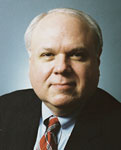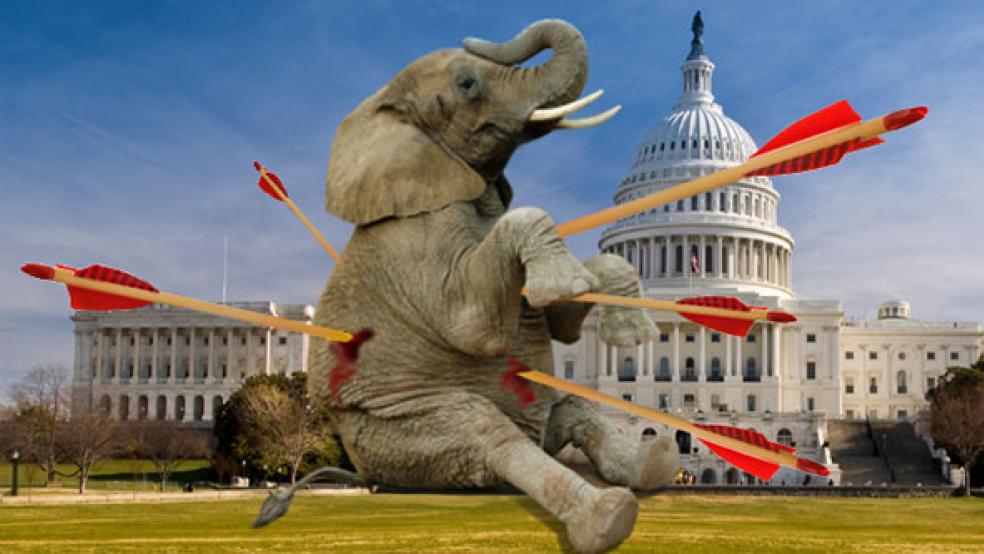The conventional wisdom is that Republicans are in good shape going into next year’s congressional elections.

Gerrymandering and the enormous benefits of incumbency virtually guarantee them continued control of the House of Representatives, it is widely believed by Washington insiders, while retirements and poor recruiting by Democrats have given Republicans a good shot at control of the Senate as well.
But beneath these positive signs is a growing amount of poll data showing that Americans are getting fed up with Republican tactics in Congress. They are tiring of gridlock and largely blame Republicans for it. The popularity of the Republican brand is falling from an already low level and there are signs that voters are sufficiently disgusted to clean house.
This week saw several polls with bad news for Republicans.
First is the NBC News/Wall Street Journal poll , which asked people whether they favored a Republican-controlled or Democratically-controlled Congress next year. The results were tied at 44 percent, which actually represents a slight improvement for Republicans since last month’s poll.
But one question jumped out at me. When people were asked if they support reelection of their current representative or someone new, only 32 percent said their representative deserves reelection versus 57 percent who favor someone new. This is a sharp change from recent trends, in which more than 40 percent said they support reelection of their own representative and less than 50 percent favored someone new.
In fact, the results right now are almost identical to those in 2010 when Democrats lost their majority and Republicans took control of the House. Just before the 2010 election only 31 percent of people favored reelection of their representative with 56 percent favoring someone new.
Since Democrats controlled Congress in 2010, they had the most to lose from a “throw the bums out” mentality. With Republicans in control today, they have the most to lose from a repeat of that sentiment.
Indeed, there is reason to believe that Republicans are now in worse shape than Democrats were in 2010. The poll also asked people if they could vote to replace every member of Congress, including their own, 57 percent of people said they would versus just 39 percent who would not. By contrast, before the 2010 election, 45 percent of people favored wholesale turnover in Congress with 50 percent opposed.
Extreme partisanship appears to be a growing problem for Republicans. According to the poll, 45 percent of people believe Barack Obama’s primary concern is unifying the country versus 48 percent who say he emphasizes partisanship. These numbers are not great, except in comparison to those for Republicans. The poll says only 22 percent of people believe Republicans emphasize unifying the country while two-thirds say that they are only motivated by partisanship.
Constant filibusters and obstructionism in Congress appear to be taking their toll on Republicans. The poll says that 56 percent of people believe Republicans are too inflexible in dealing with President Obama. By contrast, only 38 percent of people thought Democrats in Congress were too inflexible in dealing with George W. Bush in 2007.
A YouGov poll this week confirms the growing frustration of voters with gridlock and obstructionism in Congress. An overwhelming 69 percent of voters say that Congress is gridlocked and only 7 percent say no.
When asked which party is primarily responsible for gridlock, 41 percent blame Republicans, with just 19 percent blaming Democrats. Young people are much more likely to blame Republicans with older people more inclined to blame Democrats.
Closely related to the issue of gridlock is the question of whether people believe their representatives should be willing to compromise to get things done or stick to principle no matter what. People strongly support the former, with 63 percent favoring compromise and 37 percent for a no-compromise position.
Not surprisingly, Republicans are much more supportive of a no-compromise position. Nevertheless, 44 percent of them say that compromise is necessary. Democrats much more strongly support compromise than Republicans oppose it, with 78 of Democrats favoring compromise and 56 percent of Republicans opposed. Importantly, 62 percent of independents support compromise, with 38 percent opposed.
Overall, 59 percent of people say Republicans should compromise more often.
Finally, an ABC News/Washington Post poll confirms Republican difficulties.
When Republicans and Republican-leaning voters are asked whether they support the leadership of the Republican Party, just 37 support it, with 52 percent opposed. By contrast, 72 percent of Democrats support the leadership of their party, with just 21 percent opposed.
When people are asked about compromise versus standing for principle, just 26 percent say their leaders should stick to their principles no matter what, down from 37 percent in 2010. The percentage of people saying that party leaders should cooperate with members of the other party to get things done has risen to 68 percent from 57 percent in 2010.
Democrats are now moving to capitalize on voter frustration with Republican obstructionism. They have prepared advertisements focusing on Congress’s lack of productivity and unwillingness to do its basic job of voting on legislation and dealing with national problems.
There are many areas where Republicans are vulnerable to the do-nothing charge. After years of complaining that the nation had no budget – meaning a budget resolution required by the Budget Act of 1974 – when Democrats in the Senate didn’t pass one, Republicans are now blocking final action on the one that the Senate passed earlier this year.
Almost every other week, it seems, House Republicans waste a considerable amount of time taking yet another symbolic vote to repeal the Affordable Care Act, which won’t even be considered by the Democratic Senate, while sitting on the bipartisan immigration bill passed by the Senate for fear that too many House Republicans might support it.
Meanwhile, appropriations bills languish as the fiscal year winds to a close at the end of September. Republicans brag about shutting down the government and holding an increase in the debt limit, which simply funds previously-enacted spending bills, unless exorbitant demands for spending cuts are met.
It is too soon to say what the electoral consequences of this will be in next year’s elections and of course the usual caveats apply – it’s early, things can change etc. Still, it’s apparent that Republicans are playing a dangerous game and they could end up on the losing end of voter disgust with gridlock and a do-nothing Congress.






